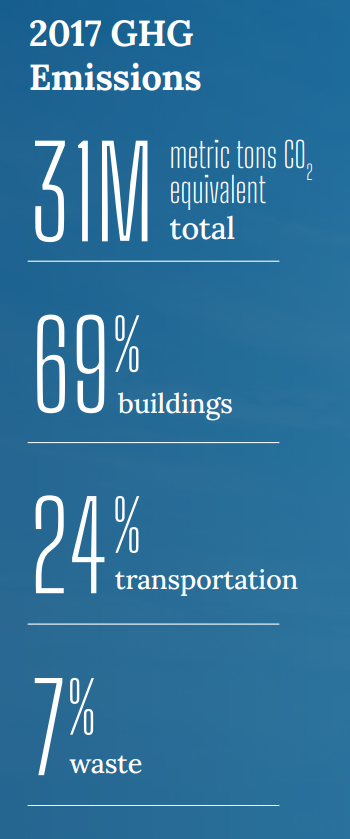Electrify Chicago
An independent tool for viewing City of Chicago building data
According to the
2022 Chicago Climate Action Plan,
69% of Chicago's emissions come from buildings, making
building emissions our biggest challenge and our biggest opportunity as a city
to tackle climate change. At Electrify Chicago, we showcase building performance using
publicly available data supplemented by community-submitted photographs and building
owners.
Start by looking at Chicago's buildings with the highest greenhouse gas intensity i.e. emissions per square foot. Large, efficient, buildings can perform much better than very inefficient small buildings on this metric.
New Article
📰 $30 Million In Missed Fines
The City Of Chicago failed to collect $30 million in potential fines from the building benchmarking ordinance, reducing transparency and accountability.
Legislative update! 🎉
As of late January 2024, legislation is being introduced to require new use more efficient forms of water and space heating, via the Clean And Affordable Buildings Ordinance (CABO), which will reduce the number of highly polluting and inefficient buildings that end up on this site.
If you're in Chicago,
write to your alderman to support the CABO!
Chicago Buildings by Greenhouse Gas Intensity
Note: Data includes large Chicago buildings with data from 2022, unless explicitly stated otherwise.
Note: This data only includes buildings whose emissions are reported
under the
Chicago Energy Benchmarking Ordinance. According to the City “As of 2016,
this list includes all commercial, institutional, and residential buildings larger than
50,000 square feet.” This dataset is also then filtered to only buildings with
reported emissions > 1,000 metric tons CO2 equivalent.
The latest year of data is from 2022, but we update the site regularly when new data is available, and some buildings may have failed to report that year, and only have older data available.
| Property Name / address | Primary Property Type |
Greenhouse Gas Intensity (kg CO2 eq./sqft) |
Total Greenhouse Emissions (metric tons CO2 eq.) |
|---|---|---|---|
|
NORTH CENTER 4000 CONDOMINIUM ASSOCIATION
4015 4027 N LINCOLN AVE
| Multifamily Housing | 4.7 kg/sqft
Lowest 20%
| 352 tons
Lowest 13%
|
|
2232 W FARWELL AVE
🏆
2232 W FARWELL AVE
| Multifamily Housing | 4.7 kg/sqft
Lowest 20%
| 240 tons
Lowest 4%
|
|
324 N JEFFERSON ST
324 N JEFFERSON ST
| Multifamily Housing | 4.7 kg/sqft
Lowest 20%
| 177 tons
Lowest 1%
|
|
Werner Printing
565 W Randolph St
| Office | 4.7 kg/sqft
Lowest 20%
| 391 tons
Lowest 16%
|
|
1631 S MICHIGAN AVE
1631 S MICHIGAN AVE
| Multifamily Housing | 4.7 kg/sqft
Lowest 20%
| 401 tons
Lowest 17%
|
|
2636 2644 W NORTH AVE
2636 2644 W NORTH AVE
| Multifamily Housing | 4.7 kg/sqft
Lowest 20%
| 284 tons
Lowest 7%
|
|
Yeshiva Ohr Boruch
🕰️
2828 W Pratt Blvd
| K-12 School | 4.7 kg/sqft | 283 tons |
|
K2 Apartments
365 N Halsted St
| Multifamily Housing | 4.7 kg/sqft
Lowest 20%
| 3,361 tons
Highest 11%
|
|
Parkway Gardens
🚩
6415 S Calumet Ave
| Multifamily Housing | 4.7 kg/sqft
Lowest 20%
| 4,428 tons
Highest 8%
|
|
One East Delaware
1 E Delaware Pl
| Multifamily Housing | 4.7 kg/sqft
Lowest 20%
| 2,399 tons
Highest 19%
|
|
Roosevelt HS, Theodore -CPS
(CPS)
3436 W Wilson Ave
| K-12 School | 4.7 kg/sqft
Lowest 20%
| 1,515 tons
Highest 31%
|
|
949 W MADISON
949 W MADISON
| Multifamily Housing | 4.7 kg/sqft
Lowest 20%
| 610 tons
Lowest 34%
|
|
312 328 N MAY ST
🕰️
312 328 N MAY ST
| Multifamily Housing | 4.7 kg/sqft | 560 tons |
|
Millworks
🕰️
2011 West Belmont
| Multifamily Housing | 4.7 kg/sqft | 294 tons |
|
10725-Bucktown
2140 N Elston Ave
| Multifamily Housing | 4.7 kg/sqft
Lowest 20%
| 1,478 tons
Highest 32%
|
Data Source:
Chicago Energy Benchmarking Data
